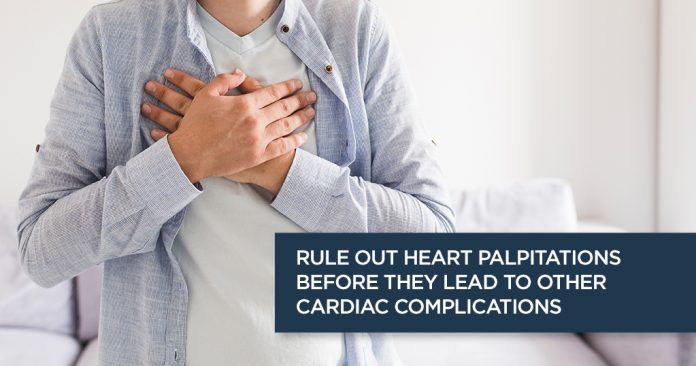Heart palpitations are when your heart starts beating irregularly and unexpectedly fast. These heart palpitations usually arise as a result of stress, anxiety, or too much consumption of caffeine, nicotine, or alcohol. You can feel these sensations in your chest, neck, or throat.
Heart palpitations are usually harmless and often go away on their own. But, in some rare cases, they can lead to serious heart conditions such as heart attack, coronary artery disease, heart failure, heart valve problems, and heart muscle problems. Having a basic knowledge of heart palpitations and its complications can help you rule out all such diseases related to them.
What are heart palpitations?
Heart palpitations are sensations of having your heart beating unexpectedly fast, fluttering, pounding, or skipping a beat. In simpler terms, heart palpitations can be described as non-threatening hiccups in your heart’s rhythm. For most individuals, heart palpitations are a once-in-a-blue-moon occurrence. At the same time, some individuals may have dozens of these palpitations in a single day. People might feel that their heart is beating inside their chest, throat, or neck.
Now that you are aware of the disease let’s have a look at some of the symptoms associated with it.
Symptoms of heart palpitations
The symptoms of heart palpitations are
- Heart skipping beats
- Heart pounding
- Heart beating too fast
- Flip-flopping
- Heart throbbing
- Heart fluttering rapidly
In case you have a serious heart condition, heart palpitations will be accompanied by
- Breath shortness
- Dizziness
- Chest pain
- Fainting
In such severe cases, you should seek medical attention immediately.
If you’re experiencing one or many of the symptoms mentioned above, they might be brought along by the following risk factors.
Risk factors associated with heart palpitations
There isn’t a single cause of heart palpitation. Some of the common risk factors associated with heart palpitations include:
- Strong emotions such as depression, anxiety, fear, stress, or panic attacks
- Strenuous physical activity such as heavy exercises or job involving arduous manual labor
- Consumption of stimulants such as caffeine, alcohol, nicotine, or illegal drugs such as cocaine and amphetamines
- Prior medical conditions such as thyroid disease, low sugar, and blood pressure levels, fever and dehydration
- Hormonal changes that can occur in women during menstruation, pregnancy, or menopause
- Previous cardiac-related issues such as arrhythmia, heart defect, heart attack or heart surgery
- Medications such as diet pills, cold and asthma medicines, decongestants
Let’s have a look at various treatments available for heart palpitations.
Treatments available for heart palpitations
Heart palpitations don’t require treatment unless you have an underlying heart condition. Your doctor may suggest certain strategies to avoid a palpitating heart.
To reduce anxiety and stress:
- Yoga
- Meditation
- Aromatherapy
- Guided imagery
Stress and anxiety are key triggers for heart palpitations. Hence, in most cases, they are the major cause of heart palpitations in individuals. A stress-free lifestyle can significantly help reduce instances of a palpitating heart.
Eliminate particular food, beverages, and other substances such as:
- Alcohol
- Nicotine
- Caffeine
- Drugs
- Cough and cold medicines
If these lifestyle changes aren’t helpful, your doctor may prescribe medications. Medications called beta-blockers. They control the flow of ‘beat now’ signals that regulate the heartbeat. In rare cases, a medical procedure called ablation might be needed.
To determine the cause of your heart palpitations, your doctor may prescribe the following tests.
Blood test: A blood test is sometimes all you need to find the cause of your palpitating heart.
Chest X-ray: An X-ray will help the doctor check for changes in the lungs that could have arisen from heart problems.
Electrocardiogram: An electrocardiogram can be performed when you are at rest or exercising. In both these instances, the test helps find unusual heart rhythms by recording the heart’s electrical signals.
Echocardiogram: An echocardiogram is your heart’s ultrasound. It provides detailed information about your heart’s structure and function.
Holter monitoring: In this method, you will be required to wear a monitor on your chest. The device can record your heart’s signal continuously for 24 to 48 hours and can identify your heart’s rhythm differences that can be missed by an electrocardiogram.
If any can’t treat your heart palpitations of the methods mentioned above, your doctor may refer you to a heart rhythm specialist, known as an electrophysiologist.
Precautions to prevent heart palpitations
They say ‘precaution is better than cure.’ So, here are some precautionary methods to avoid going to the doctor in the first place:
- Avoid situations or environments that induce stress or anxiety.
- Seek medical intervention if you are suffering from depression.
- Avoid medication that acts as stimulants.
- Make lifestyle changes to reduce stress.
- Cut out certain foods, beverages, and medication.
FAQs of Heart Palpitations:
- What are the causes of palpitation?There can be multiple causes of heart palpitations. Some of the common causes that your heart might be palpitating include prior heart and other medical conditions, hormonal changes, medications, stress and anxiety, and stimulant intake.
- When should I go to the doctor for heart palpitations?You need to visit a doctor for heart palpitations if you have other symptoms such as shortness of breath, dizziness, chest pain, or fatigue when your heart is palpitating. You should also visit a doctor for heart palpitations if you have a history of heart diseases.
- Are heart palpitations a sign of a heart attack?No, heart palpitations aren’t a sign of a heart attack. However, you do need to seek medical advice if you experience other discomforts at the time of heart palpitations.


















